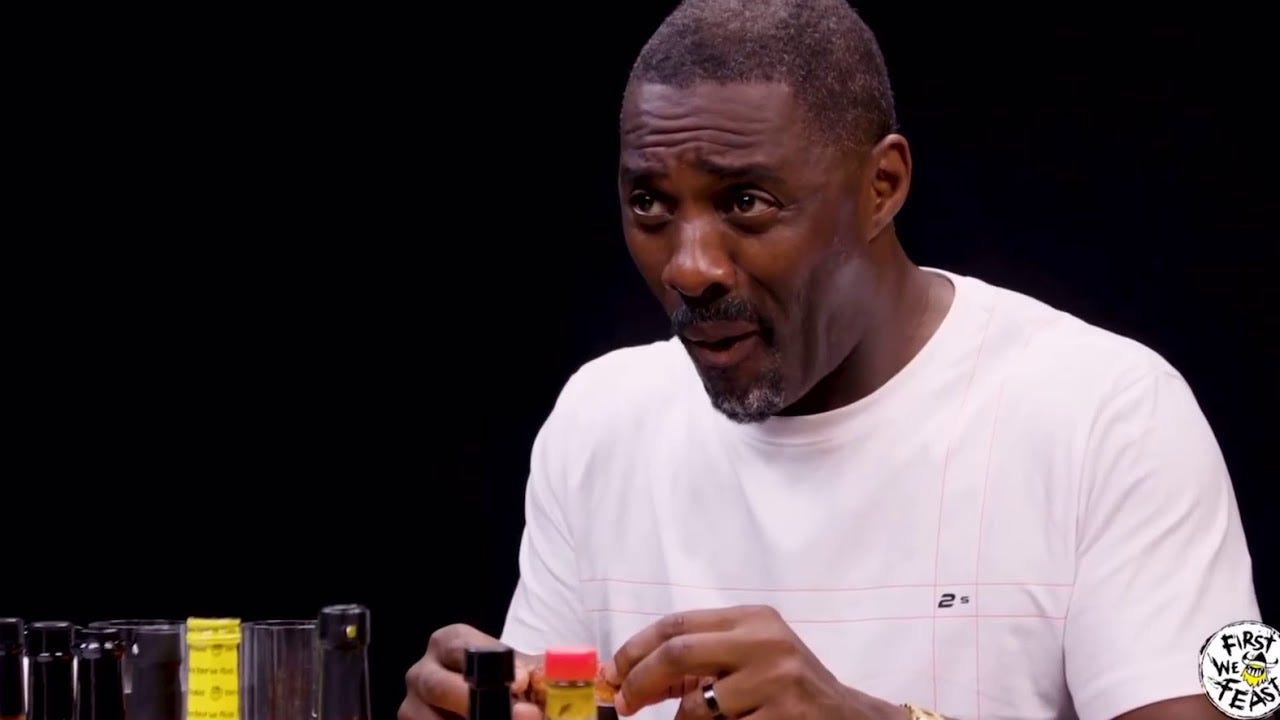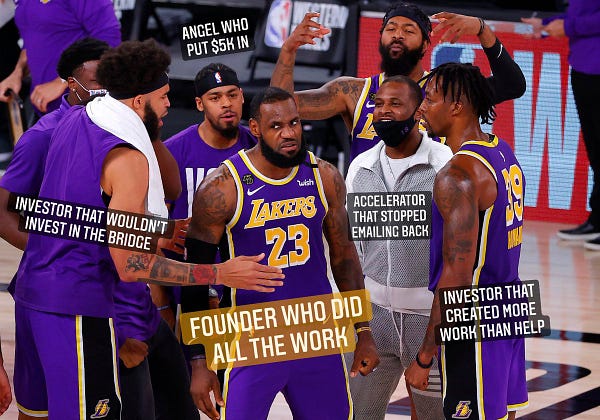Choosing a VC: The stuff people don't talk about
Hidden issues and spicy questions you should probably ask

(Hot Ones / First We Feast)
There's lots of content about what to think about when choosing an investor. In fact, a lot of it has been written by investors, in the form of thinly-veiled content marketing, where the conclusion is 'hey guess what, our fund fits all the criteria we just outlined above!'. I'm half-joking, marketing is part of the business and there's genuinely helpful content out there (see links below).
Here I’m going to highlight aspects of the founder-VC story that are rarely discussed. The things that, all else being equal (valuation, track record, sector knowledge, etc) are really important for you to understand before agreeing to sell a stake in your company. They’re all points I’ve regularly discussed with individual founders over the past few years.
Note: Most of this assumes you have the luxury of choice, with multiple (or at least more than one) offers on the table. But there are also points that are relevant to think about when you first sit down and draw up your initial list of investors you want to engage with.
1. Understanding the partner dynamics
Not all partner titles are made equal, despite what the team page might say. One one end of the spectrum you might have the veteran partner type who founded the fund, has a bunch of big exits under their belt and has the biggest say in major decisions. On the other end you’ve got the recently hired or promoted ‘junior’ partner who’s making their first investments in their own right.
The senior partner may have more experience, a larger network, and critically, more clout within the fund which can swing decisions in you favour. However, they may also be less hungry for success and have less time for you due to other commitments, including sitting on other boards.
On the flipside, a junior partner may have less influence, but is likely to have more time to support you, and will usually go bat for their companies like their career depends on it (…it does).
Whichever profile your potential partner matches most closely, the worst case scenario is if they leave the fund (maybe to start their own fund, as is happening more frequently) or is asked to move on. In both cases, you’re left as an ‘orphan investment’. This is okay if you’re crushing it but can be less fun if you need more support from the fund in the future.
How to diligence:
Partner dynamics aren’t easy to tease out, and a lot will rely on your own judgement as you build a relationship with the partner and wider fund.
Reference calls with founders the partner has backed in the past are critical, especially where the the company didn’t work out. Other investors (especially existing investors, if you have any) can also provide valuable perspectives on the individual.
Questions to ask:
Do you see yourself at this fund in 10 years? What would change that?
Can you introduce me to a few founders you’ve backed in the past?
Can you introduce me to a few investors or former colleagues you’ve worked with in the past?
What’s the worst experience you’ve had with an investment?
Have there been any deals you wanted to do but couldn’t? Why?
What are they main ways you support your portfolio companies?
2. Fund cycles
Your average VC fund will have a lifetime of 10 years. Within that period the fund has to deploy capital by investing in companies, manage those investments as they mature, and distribute returns to their investors along the way. Most funds allocate a certain % of the fund for initial investments, and the rest for follow-on funding, referred to as ‘reserves’. Where a specific fund is within the first phase (investing stage) can have an effect on your access to reserves. This is especially important if you’re an early-stage company (i.e. pre Series B) and are banking on the support of current investors for future rounds.
Comparing two scenarios:
Company A is the first investment in Fund X, made in the first 12 months of the fund’s lifecycle
Company B is the 15th investment in Fund X, made in year 3 of the fund’s lifecycle
Every fund will have a different strategy when it comes to investing in follow-on rounds but the general idea is to deploy as much capital to the most successful companies in the portfolio. When an investment is first made the fund won’t know if it’s a ‘fund-returner’, but over time the likely winners start to emerge, deemed more likely to produce a large exit and deserving of reserves.
The trouble is that company B will have less time to mature and ‘prove’ its worth for reserves, and there may be less available by then as earlier investments have already raised follow-on rounds. This is not an issue if other investors are knocking down your door to invest but can become a tougher situation if you need to raise a bridge round. All things being equal, you want to closer to the start of a fund.
How to diligence:
Just ask. Clarifying when the latest fund was raised and how a fund is structured is not controversial and can be covered in an initial conversation.
The reality is that there’s little you can change about the situation (i.e. if you have a preferred investor but you happen to be the 'final investment’ in that fund), but at least you are aware of the situation and can ask the right questions about how they think about follow-on funding
Questions to ask:
When was the current fund raised?
How many investments have you made from this fund and how many do you expect to do in total?
How much of the fund is reserved for follow-on rounds?
Do you do your pro-rata in follow-on rounds? How do you decide?
When have you chosen not to do your pro-rata?
3. Get to know the rest of the team
Your strongest relationship will be with the person leading the deal. Most deal processes involve interacting with the rest of the team, but the depth of that will vary a lot (sometimes just involving a presentation to the IC when you’re close to the the final decision). Building a relationship with other partners has little downside and at best can protect you if a) your partner moves on and b) help you get the most out of the fund by having multiple touch points. At this point I’ll also highlight the non-partners who are working on the deal. By the time a deal closes they may end up knowing more about your business and market than the partners and can be a useful resource and ally to you, maybe even a future hire for your team.
How to diligence:
In the later stage of a fundraising process, make a point to meet and spend time with other members of the partnership.
Questions to ask:
How are the incentive structures in the fund set up? Is the carry pool shared on a fund level or deal-by-deal?
4. LPs: your investor’s investors
Funds usually have a set of investors (limited partners, ‘LPs’) who provide the capital they invest. The universe of LPs is pretty broad, including pension funds, university endowments, corporates and high-net-worth individuals. This may seem abstract but there’s no reason you shouldn’t understand where the money comes from.
The provenance of capital wasn’t a top-of-mind topic for most in tech and venture until 2018, when the the leaders of Saudi Arabia were accused of orchestrating the assassination of journalist Jamal Khashoggi. In the aftermath, many pointed out that the Kingdom’s sovereign wealth fund was one of the main investors Softbank’s Vision Fund, which holds significant stakes in some of the most high profile tech companies in the world. Founders and investors were suddenly grappling with the publicity of this connection and the billion-dollar question became “would you take the money anyway?” This is a dramatic example but the truth is that any fund that claims absolute moral purity is probably lying to themselves. To what extent you want to factor any ethical implications into your decision making is entirely your choice.

How to diligence:
Just ask. You’re unlikely to get exact names and figures, but investors should be able to give you a good idea of what type of LPs make up their fund.
Questions to ask:
What’s the composition of your LP base? Who are the largest investors?
What portion of your LPs have invested in previous funds?
When are you raising you next fund?
Venture capital, for all its blog posts and podcasts can still sometimes feel like the most opaque and random source of capital. I hope this helps surface key questions before you sign on the dotted line. If you have any feedback or questions, please comment or get in touch. Good luck and godspeed 🚀
Further reading:
15+ Due Diligence Questions You Really Should Be Asking Every VC You Meet - Jason Lemkin (SaaStr)
20 Questions Entrepreneurs Should Ask Investors - Alejandro Cremades (Forbes)
Observations from raising a Series A in 2020 - Hjalmar Gislason (founder of Grid)






